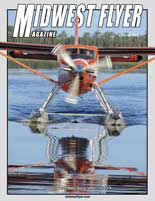by Jim Hanson
Published in Midwest Flyer – October/November 2017 issue
Recently, an airport manager from Minnesota who is responsible for the fuel sales at his airport, was confused over how he was expected to report sales tax on auto fuel sold for aircraft under changes enacted during the last legislative session, so he asked for clarification. It turned out that there was bad intention, bad forms, and bad direction to account for fuel taxes, but today there is understanding between the airport retailer and Minnesota Department of Revenue. Here’s what was learned:
• Minnesota charges 28.5 cents tax on each gallon of auto fuel sold.
• In the past, purchasers could claim a 23.5 cent per gallon refund by applying for it, as the aviation tax for fuel dispensed on an airport is only 5 cents.
• Airport retailers could conceivably claim the same 23.5 cents per gallon.
• Starting July 1, 2017, airport retailers of auto fuel can opt to have their fuel suppliers NOT charge the 23.5 cent fuel tax – only the 5 cents. This is a big savings in paperwork AND fuel tax. (Note: The airport manager is having his wholesaler research how best to submit the form.)
• The confusion is because the rebate form provided reads “distributor” – not “retailer.” It also references “jet fuel” instead of “aviation auto fuel.” There is no updated form as of yet.
• Retail purchasers of auto fuel, whether from an on-airport vendor or the local gas station, may apply for the 23.5 cent rebate using the form for each calendar year when supported by receipts showing the total tax paid. The rebate request must be submitted before April 30 of the following year.
• Presumably, airport retailers will not be charged the 23.5 cent tax by their distributors, so fuel purchased from the airport vendors will not be eligible for rebates. Thus, the requirement to document how much tax was or was not paid. If the retailer did not have to pre-pay the tax, the price of auto fuel at airports should come down–making it more competitive with gas stations.
• The Minnesota Department of Revenue was not aware that aviation self-serve pumps do not break out tax paid. Most airport fuel retailers won’t break out tax paid, either.
Operational Implications
1. If an airport fuel retailer dispenses “aviation auto fuel,” they should ask their aviation fuel distributor for an exemption from the 23.5 cents per gallon tax for any auto fuel purchased for resale after July 1, 2017, charging ONLY the 5 cents per gallon going to help fund the Minnesota Department of Transportation Office of Aeronautics. They should adjust their prices accordingly.
2. This may make airport retailers more competitive with auto fuel service stations – cutting the price differential. Those that purchase auto fuel from non-airport locations will likely NOT file for the refund.
3. Recordkeeping. If the airport retailer is exempt from the tax by their distributor, they do not need to capture pilot names, aircraft registration numbers, tax paid, etc. If the airport retailer pays the tax, they (and their customers) will have to file for the rebate, using the record-keeping requirements. Unless the aircraft owner is burning a lot of auto fuel, it may not be worth the effort in record-keeping and filing for the rebate. The owner would have to use 425 gallons of auto fuel per year to save $100.
4. When asked why this issue came up, the airport retailer was told that the Minnesota Department of Revenue, “Does not want someone fueling their car from an airport tax-exempt pump.” The airport retailer explained that with the special care and handling of aviation fuels, aviation auto fuel costs MORE than what a pilot would pay at the pump at the local gas station. There is no economic reason to buy aviation auto fuel for one’s car at an airport.
5. If, for some reason (convenience) the airport retailer wants to fill the airport weed-eater from the aviation auto pump, they would be subject to the tax and the record-keeping. It’s not worth the hassle for the minute amount of money involved. Many airports have a “sump bucket” to collect fuel drained from airplanes during preflight, rather than the old practice of dumping it on the ground. Since that fuel has already been pumped into an airplane, the airport retailer can use that fuel in their weed-eater. Weed-eaters don’t care if the little fuel they burn contains a mixture of 100LL and auto gas.
6. The Minnesota Department of Revenue argues that “fuel must be dispensed directly into an airplane,” therefore prohibiting fuel from going into cans, barrels, or portable tanks for use on seaplanes, ski planes, ag planes, or farm strips. The Minnesota Department of Revenue has no answer for this, other than an unofficial, “If the fuel is dispensed from an airport fuel farm, by a pilot, and intended for aviation use, that seems to qualify as ‘into an airplane.’”
In summary, the airport retailer mentioned here suggests that it would be so much better for fuel wholesalers, retailers, and pilots if the tax were simply left alone, and the entire tax was dedicated to the Minnesota Department of Transportation Office of Aeronautics to help fund state airport projects, rather than being diverted into the highway fund. The increased regulation and reporting requirements will likely result in FEWER airports choosing to offer auto fuel.
For additional information on aviation fuel taxation, contact the Petroleum Tax Unit at the Minnesota Department of Revenue at 651-296-0889.
EDITOR’S NOTE: Pilots, aircraft owners and airport managers in other states should research how aviation fuel is taxed in their respective state, and get clarification where necessary.










